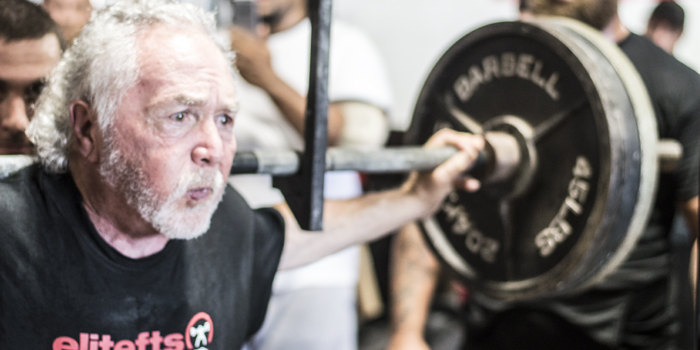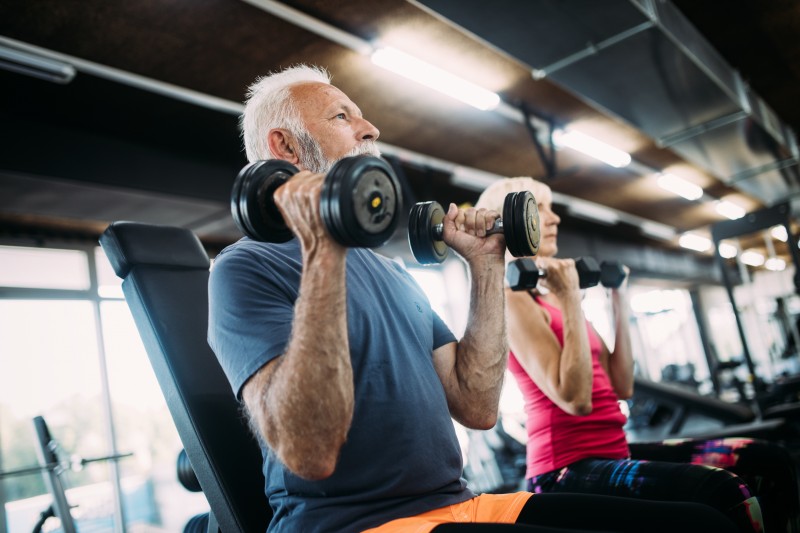
Thank you, thank you, thank you. I am thrilled to have reached so many people through my last article. And thank you for the comments on the elitefts site and social media. I would comment on the present craziness, but I have no solution to recommend. It is my opinion that to discuss a problem without proposing a solution is whining. I don’t feel trapped at home; I feel secure at home. Plenty of food, toilet paper, and some weights and bands with which to train. What could be better? Training at home makes me realize how much help I need. I will be ecstatic when our gym opens.
Now down to business. I will try not to repeat much of what I have said in my previous article, but I may, in an effort to explain and clarify. We all now know that we begin to lose muscle in our third decade. It happens so insidiously slow that we don’t realize it. We lose only 1 to 1.5 percent per year, increasing as we get older. We wake up one day at age 70, and we have lost 50 percent of our muscle mass. We then realize that we cannot do what we used to. We chalk it up to old age and, if continued, will render us frail and unable to function. Medical science has a name for this phenomenon: Sarcopenia—“Muscle loss that occurs with aging and/or immobility. Degenerative loss of skeletal muscle mass, quality, and strength.”
PART 1: The Advantages of Weight Training for Seniors
Muscle is a very metabolically expensive tissue. If you become sedentary, you send your body a signal that this tissue is not useful. The body’s adaptation is to deconstruct that tissue. In addition, as we pass our third decade, we experience somatopause. Our levels of HGH starts to fall alarmingly. HGH is required to maintain fast-twitch muscle fiber. The loss also increases adipose tissue and the loss of lean muscle mass.
Now that we have a name, we also know how to prevent and cure the condition. WEIGHT TRAINING. Too many of my peers tell me that they think it’s too late for them to begin. To them, I say bullshit! The American College of Medicine reports, “Given an adequate training stimuli, older adults can make significant gains in strength. A two to threefold increase can be accomplished in muscle fiber in a few months. With prolonged training, increases in muscle size are also possible. With muscle strength comes increased levels of spontaneous activity even in old and frail men and women. Also are the positive effects of insulin activity, bone density, energy metabolism, and functional status. “We knew weight training made us better; they just told us how." In a study of nursing home residents, whose average age was 90, their strength was increased between 167 to 180 percent after eight weeks of strength training.

nd3000 © 123rf.com
My friend, of whom I have spoken, is now 88. he trains three times a week without fail. He adds weight as he can, works every day, and plays golf. Another friend, who is 97 (I have some older friends) trains regularly with a trainer. He does all he can and is viable, both physically and mentally. Both of these men are former college athletes. While it is not necessary, it helps to have a previous culture of sports and training. I am fortunate that my parents made sports and training available to my siblings and me, and we took full advantage. Baseball, football, basketball, and swimming were all on the menu, often more than one at a time. Today my sister (73) is a regular at her CrossFit box, my brother (77) plays golf, and some tennis and I (78) compete in powerlifting. We have all done something all our lives. My son (48) was a college swimmer and continues to train three or four times a week, my daughter (50) trains in kickboxing of all things. My granddaughter (19) plays soccer at UNCW, and my grandson (14) plays travel baseball and high school baseball. We have developed the culture, and I trust they will all be active all of their lives. But even without the culture, we have to convince our seniors to begin weight training.
In preparation for this article, I read a piece about all the terrible things that can befall seniors who do not engage in weight training. Rather than discuss that, I want to turn it around and talk about the positive effects of senior weight training. Eighty percent of adults do not engage in enough physical activity to reach prescribed guidelines. For seniors who do undertake a regime of weight training, they experience lower blood pressure, reduced risk of heart disease, diabetes, cancer, Alzheimer's, and depression. These are all in addition to combating age-related muscle loss and metabolic dysfunction. WE MUST CHANGE FRAIL TO ROBUST.
Once we get our seniors into the gym, then what? All too often, I have seen seniors come into the gym and walk on a treadmill for a time. Then they go over to the machines and are confused about which ones to use and how to use them. Then they wander over to the free weights, pick up some light dumbells, do some curls, and go home. Well, he is way ahead of the guy on the couch. But he needs some help from you or me or somebody. I have said that it should be the responsibility of every gym owner to teach every new member how to use every machine in the gym and give some instruction in the use of free weights. It is also up to you and me to help. LIVE, LEARN, AND PASS ON. I have never been refused help when I have asked, and I have never refused to help when asked. Everyone needs help when they first come to a gym. A competent trainer would be helpful, but they are few and far between. Help when you can without being asked.
Now that we have seniors in the gym, what do we teach them? For those without a specific preference, we should teach them compound movements, essentially the principles of powerlifting. Additionally, with seniors, we need to emphasize the speed component in power. That is, power equals strength times speed. While muscle loss is very gradual, we lose speed three times as fast. So, we must emphasize moving non-maximal weight as fast as possible. When seniors stumble over uneven ground to catch themselves, the task requires ankle, leg, and hip muscles to contract quickly to move a foot before you fall.
When I am at a powerlifting meet, I have been approached by seniors who are there watching their children or grandchildren compete. They tell me that I have inspired them to begin weight training. That is not why I compete, but I am thrilled that it is a side-effect. If I can get a few seniors to the gym and you can get a few seniors to the gym, we will have made a good start.











You might be interested in an article I have recently published - https://nevertoooldtolift.com/weight-training-motivation/ - which highlights 4 inspiring stories of people who are lifting weights into their 60's and 70's.
Age has nothing to do (unless there is physical disability) with keeping active. PT is an everyday activity here at my FOB.
Thank you for this article and the important information you've provided. Especially important are the statistics and information you've provided with regard to muscle loss in our demographic and why it occurs. I miss training at my gym(s) with a bar, plates and a rack, but for now I've rediscovered home-training with band and bodyweight movements (especially push-ups). I've strength trained for almost 50 years and at 73 I find it more important than ever. Another benefit, at least for me, is the mental well-being that being physically fit contributes to.
I wish you continued good health and success (including on the platform).
Be well,
Joe
However, I hit it hard and feel great. Workout with one of my sons and his wife we are all at 2xs body weight and slowly gaining strength and muscle. Having a great time.
At 60 ,I just had my left hip replaced 3 days ago. I feel great. I have no plans to resume squats or deadlifts in the future, I do plan to return to resistance training. I’ve been using weights since age 12 starting with the sand filled plastic weights.
Starting out with a good level of general fitness and strength and helped my recovery enormously.
As an Orthopaedic Surgeon, I realize recovery guidelines are generalizations. Most of us are not experienced in strength training. I’ll find my path. A lifetime of strength training has given me the resources to plan ahead. Although many do go back to squats and deadlifts, the increased wear on the implant and the potential need for revision surgery is not a risk I plan to take. It’s an artificial hip, that has only so many cycles before wear starts to become a problem. There are so many training options.
Thank you for being an ambassador of the benefits of strength training.